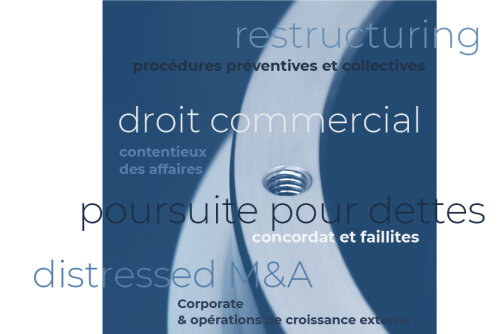Best Debt & Collection Lawyers in Paris
Share your needs with us, get contacted by law firms.
Free. Takes 2 min.
List of the best lawyers in Paris, France
About Debt & Collection Law in Paris, France
Debt & Collection law in Paris, France, is a branch of civil law that deals with issues related to the recovery of debts. It outlines the rights and obligations of both debtors and creditors, and provides a legal framework for the collection of outstanding obligations. The process is governed by various French laws including the French Civil Code and specific regulations on the recovery of debts. In France, the collection of debts must be carried out with respect to the individual's rights, and certain practices, such as harassment or intimidation, are strictly prohibited.
Why You May Need a Lawyer
Legal assistance in Debt & Collection may be necessary in several situations. If you are a debtor who is unable to meet your financial obligations, a lawyer can help you negotiate with creditors or represent you in court proceedings. Conversely, if you are a creditor, a lawyer can assist in drafting legally binding payment agreements, filing lawsuits against delinquent debtors, or ensuring that debt collection practices are compliant with French law. In both cases, legal expertise helps in reaching fair settlements and avoiding potential legal pitfalls.
Local Laws Overview
In Paris, as in the rest of France, Debt & Collection laws provide a balanced approach between protecting creditors' rights to recover what is owed to them and safeguarding debtors from abusive practices. Key aspects include the statute of limitations, which limits the time frame in which a creditor can pursue legal action for debt collection; the right to privacy, preventing creditors from publicly disclosing debtor information; and due process, ensuring that the debtor is informed and has an opportunity to dispute the claim. Furthermore, there are strict regulations on the conduct of debt collection companies, including licensing requirements and prohibitions on certain aggressive collection tactics.
Frequently Asked Questions
1. How long does a creditor have to collect a debt in France?
The statute of limitations for debt collection in France is generally five years for personal debts and two years for consumer debts, starting from the date of the last acknowledgement of the debt by the debtor.
2. Can a debtor go to jail for not paying debts in France?
No, France does not impose imprisonment for debtors as a consequence of failing to pay debts, recognizing it as a civil matter rather than a criminal one.
3. Are there any debts that cannot be discharged in France?
Yes, certain types of debts such as alimony, child support, taxes, and criminal fines typically cannot be discharged through bankruptcy or other legal means in France.
4. What should I do if I'm being contacted by a debt collector in Paris?
Make sure to understand the debt they are referring to, ask for verification, and do not ignore the communications. It's usually beneficial to consult with a lawyer to ensure your rights are protected and to explore your options.
5. Can creditors seize property without a court order in France?
Generally, creditors need a court order to seize property, unless it is a secured debt with an asset acting as collateral. Insecured debts require legal proceedings before any seizure can occur.
6. What is a 'saisie' in French debt collection law?
'Saisie' refers to the seizure or attachment of assets in compliance with a court order as part of the debt collection process.
7. Can French debt be enforced overseas?
It depends on the international agreements and the local laws of the country in which enforcement is sought. Generally, French court decisions can be enforced within the EU relatively easily, while it may be a more complex process in other countries.
8. What constitutes harassment by a debt collector in France?
Actions such as threatening behaviour, repeated phone calls at unreasonable hours, or the use of offensive language can be considered harassment.
9. Is bankruptcy an option for debt relief in France?
Yes, individuals in France can file for personal bankruptcy, though the conditions and consequences differ from those in other countries. Legal advice is important in this process.
10. How can I dispute a debt claim in Paris?
You should respond formally to the creditor or debt collection agency, ideally through a lawyer, who will help you build a case and, if necessary, defend your position in court.
Additional Resources
For those seeking further information on Debt & Collection law in Paris, France, the following resources can be of assistance: the official website of the French National Bar Association (Conseil National des Barreaux), consumer rights organizations such as UFC-Que Choisir, and the Banque de France for issues relating to over-indebtedness. Additionally, the local Paris Bar Association can provide referrals to qualified lawyers specializing in debt and collection matters.
Next Steps
If you need legal assistance in Debt & Collection in Paris, France, initiating contact with a local lawyer practicing in this field is the best first step. An attorney can assess your situation, explain your legal rights and obligations, and guide you through the appropriate legal procedures. Whether negotiating with creditors, setting up repayment plans, or advocating on your behalf in court, proper legal guidance is essential in navigating the complexities of Debt & Collection law.
Lawzana helps you find the best lawyers and law firms in Paris through a curated and pre-screened list of qualified legal professionals. Our platform offers rankings and detailed profiles of attorneys and law firms, allowing you to compare based on practice areas, including Debt & Collection, experience, and client feedback.
Each profile includes a description of the firm's areas of practice, client reviews, team members and partners, year of establishment, spoken languages, office locations, contact information, social media presence, and any published articles or resources. Most firms on our platform speak English and are experienced in both local and international legal matters.
Get a quote from top-rated law firms in Paris, France — quickly, securely, and without unnecessary hassle.
Disclaimer:
The information provided on this page is for general informational purposes only and does not constitute legal advice. While we strive to ensure the accuracy and relevance of the content, legal information may change over time, and interpretations of the law can vary. You should always consult with a qualified legal professional for advice specific to your situation.
We disclaim all liability for actions taken or not taken based on the content of this page. If you believe any information is incorrect or outdated, please contact us, and we will review and update it where appropriate.














